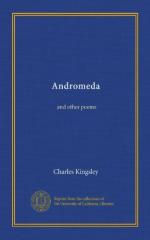ANDROMEDA
Over the sea, past Crete, on the Syrian shore to the
southward,
Dwells in the well-tilled lowland a dark-haired AEthiop
people,
Skilful with needle and loom, and the arts of the
dyer and carver,
Skilful, but feeble of heart; for they know not the
lords of Olympus,
Lovers of men; neither broad-browed Zeus, nor Pallas
Athene,
Teacher of wisdom to heroes, bestower of might in
the battle;
Share not the cunning of Hermes, nor list to the songs
of Apollo.
Fearing the stars of the sky, and the roll of the
blue salt water,
Fearing all things that have life in the womb of the
seas and the livers,
Eating no fish to this day, nor ploughing the main,
like the Phoenics,
Manful with black-beaked ships, they abide in a sorrowful
region,
Vexed with the earthquake, and flame, and the sea-floods,
scourge of
Poseidon.
Whelming the dwellings of men, and
the toils of the slow-footed oxen,
Drowning the barley and flax, and the hard-earned
gold of the harvest,
Up to the hillside vines, and the pastures skirting
the woodland,
Inland the floods came yearly; and after the waters
a monster,
Bred of the slime, like the worms which are bred from
the slime of the Nile-
bank,
Shapeless, a terror to see; and by night it swam out
to the seaward,
Daily returning to feed with the dawn, and devoured
of the fairest,
Cattle, and children, and maids, till the terrified
people fled inland.
Fasting in sackcloth and ashes they
came, both the king and his people,
Came to the mountain of oaks, to the house of the
terrible sea-gods,
Hard by the gulf in the rocks, where of old the world-wide
deluge
Sank to the inner abyss; and the lake where the fish
of the goddess,
Holy, undying, abide; whom the priests feed daily
with dainties.
There to the mystical fish, high-throned in her chamber
of cedar,
Burnt they the fat of the flock; till the flame shone
far to the seaward.
Three days fasting they prayed; but the fourth day
the priests of the
goddess,
Cunning in spells, cast lots, to discover the crime
of the people.
All day long they cast, till the house of the monarch
was taken,
Cepheus, king of the land; and the faces of all gathered
blackness.
Then once more they cast; and Cassiopoeia was taken,
Deep-bosomed wife of the king, whom oft far-seeing
Apollo
Watched well-pleased from the welkin, the fairest
of AEthiop women:
Fairest, save only her daughter; for down to the ankle
her tresses
Rolled, blue-black as the night, ambrosial, joy to
beholders.
Awful and fair she arose, most like in her coming
to Here,
Queen before whom the Immortals arise, as she comes
on Olympus,
Out of the chamber of gold, which her son Hephaestos
has wrought her.
Such in her stature and eyes, and the broad white
light of her forehead.
Stately she came from her place, and she spoke in




